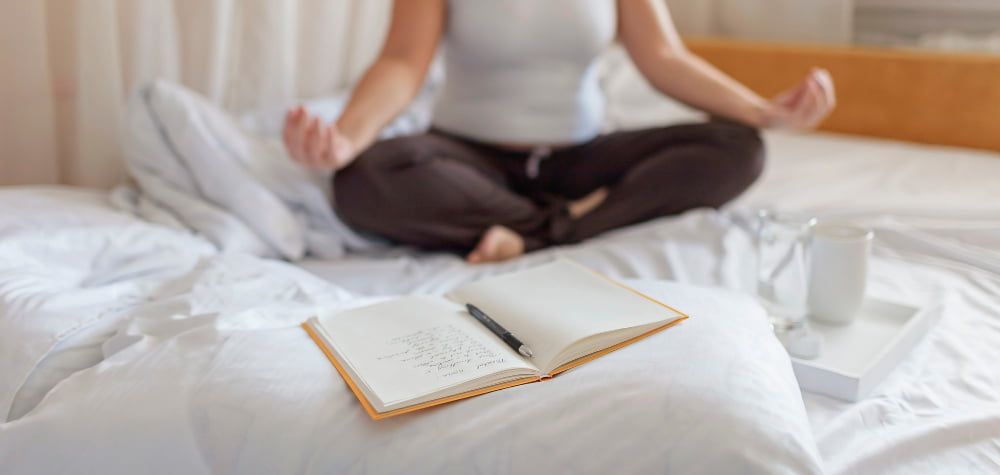Explore the unique benefits of journaling before and after meditation because it can significantly enhance your mindfulness practice.
Meditation and journaling are both powerful tools for mindfulness, but the question often arises: should you journal before or after meditation? The answer depends on your personal preference and what you hope to gain from each practice.
Journaling before meditation can help clear your mind and set your intentions, making your meditation session more focused. On the other hand, journaling after meditation allows you to record insights or inspiration that arose during your practice.
Both approaches have their benefits, and this article will delve deeper into how to maximize the effectiveness of both practices. Whether you’re new to meditation and journaling or a seasoned practitioner, you’ll find valuable insights to enhance your mindfulness journey.
Key takeaways:
- Journaling before meditation clears the mind and sets intentions.
- Journaling after meditation records insights and reflections.
- Both journaling and meditation promote mindfulness and introspection.
- Journaling before meditation helps declutter the mind and increase focus.
- Journaling after meditation captures experiences and tracks progress.
Benefits of Journaling Before Meditation

Journaling prior to meditation prompts a host of advantages. Primarily, it serves as an effective means to unclog your mental pathways. It helps in discarding random, stray thoughts that often obstruct the flow of a soothing meditation session.
It also empowers you to approach your meditation practice with clearer intent. By articulating your thoughts and emotions on paper, you are manifesting your unconscious thoughts into a tangible form. This catalyzes self-awareness and introspection, prime ingredients for a successful meditation session.
Moreover, jotting down your thoughts or struggles beforehand can act as a compass, guiding your meditation focus. It aids in defining the path of your meditation, thus rendering the practice more structured and productive.
Lastly, journaling before meditation operates as an excellent tool for setting goals. Being clear about what you want to achieve from your meditation session can enhance concentration and orient your energies towards desired outcomes.
Journaling As a Mindfulness Practice in Meditation

To illustrate, consider these approaches and techniques:
- Free-Writing: This technique involves writing continuously without pausing to edit or censor thoughts. It can help clear your mind of distractions, center your focus, and pave the way for a deeper and more meaningful meditation.
- Mindmapping: This is a visual technique that depicts the relationships between different thoughts. It can be used to visualize your thoughts and ideas, drawing connections and patterns, which can help to enhance your mindfulness and awareness during your meditation.
- Gratitude Journaling: Jotting down things you’re grateful for can put you in a positive frame of mind, helping to enhance your mindfulness meditation. It can help draw your focus toward the positive aspects of your life and away from negativity or stress that may hinder your meditation.
- Reflections: You can note down any thoughts or feelings that come to you while meditating. This can aid in self-awareness and develop your mindfulness abilities.
Remember, the purpose of journaling as a part of your meditation is not to produce a polished piece of writing, but as a tool to increase mindfulness and achieve greater depth in your meditation practice. Just let your thoughts flow freely onto your journal without judgment or inhibition, and you’ll be on your way to maximize the benefits of your meditation.
Understanding the Link Between Journaling and Meditation

Writing in a journal fosters self-awareness, much like meditation. By putting thoughts onto paper, you’re creating a mindful space that allows you to understand your feelings better. Complementarily, meditation deepens this awareness and magnifies introspection. As a result, these practices are intertwined in their mutual ability to enhance overall well-being, decrease stress levels, and illuminate the path to self-discovery.
Here are key points to explain the linkage between these practices:
- Both promote mindfulness: By focusing your attention on the present moment, you’re cultivating mindfulness, which is the foundation of both journaling and meditating.
- They encourage introspection: The act of writing about your thoughts and experiences provides a pathway to introspection that meditation amplifies.
- They provide emotional release: These practices allow a safe space for emotional release, an essential part of stress management and mental health.
- They foster personal growth: Regular commitment to journaling and meditation improves self-understanding and encourages personal growth.
- The two create a cycle of mindfulness: The keen sense of self-awareness developed through journaling feeds directly into meditation, while the peace and clarity gained from meditation can be recorded and reflected on within journal entries. This results in a harmonious cycle of mindfulness.
How Journaling Can Enhance Your Meditation Experience

Having put pen to paper and structured your thoughts through journaling, you’ll find the mind to be more focused, and less cluttered. Here’s how this process enriches your meditation sessions:
1. Reduces Mental Clutter: Journaling aids in decluttering the mind by acting as an outlet for thoughts, worries, or ideas. This decluttering serves as a precursor to a more focused meditation session.
2. Sets Intention: Writing in a journal before meditating allows you to set intentions. Whether it’s reaching a state of mindfulness, finding solutions to dilemmas, or simply relaxing the mind, entering the meditative state will thus be more purposeful.
3. Increases Emotional Awareness: Journaling encourages you to acknowledge and release pent-up emotions. Recognizing these feelings before your meditation session can increase the effectiveness of your practice by letting you delve deeper into your emotional state, encouraging self-awareness, and promoting healing.
4. Facilitates Transition: By engaging in journaling prior to meditation, you create a bridge between the active tasks of your day and the quiet introspective period of meditation. This smooth transition helps to prepare the mind for a tranquil meditation session.
Benefits of Journaling After Meditation

There are several reasons why one might choose to write in their journal after a meditation session. Firstly, it’s an ideal time to capture the essence of your experiences; meditation often offers fresh perspectives and untangles complex emotions, which can be crystallized through post-meditation journaling.
Furthermore, exploring your meditation journey on paper can give you measurable feedback on your progress. Noting the quality of your focus, the thoughts or emotions that arose, or the insights gleaned will allow you to track your meditation progress over time.
Sharing your experiences through journaling also provides accountability and commitment to your practice, keeping you motivated even when the practice gets challenging.
Finally, using a journal to articulate meditation experiences can contribute to better comprehension and retention. Sometimes, we stumble upon profound realizations during meditation that can seemingly disappear as soon as we open our eyes. Writing them down helps to solidify these fleeting moments of clarity and understand them more deeply.
Exploring Personal Experiences: Journaling Before Vs After Meditation

As we delve into our meditation practice, the unique ways we experience it can unravel intriguing insights. These experiences may differ when we journal before or after meditation.
Journaling before meditation often helps in setting an intention, guiding our focus throughout the session. It brings forth any lingering thoughts or feelings that may be addressed in the meditative practice, clearing mental clutter and fostering a deeper state of awareness.
On the other hand, journaling after meditation can record fresh insights and revelations that emerged during the session. The tranquil and unburdened mind-state post-meditation often makes way for profound self-discoveries, which can be noted for future reflections.
However, the decision to journal before or after meditation essentially boils down to individual preferences and which method resonates more with your personal experiences. Some people find more clarity in setting their minds before meditating, while others tend to benefit more from recording the calm, introspective thoughts that follow a meditation session.
In the end, the objective is to supplement and boost your mindfulness practice by coupling it with journaling at a time that feels most conducive to you. Whether it’s before diving into meditation or post the quiet stillness, keeping a journal serves as a tangible evidence of your inward journey, enriching your overall meditation experience.
Journal Vs Meditation: Which Should Come First?

Determining whether to journal before or after meditation largely depends on individual preferences and goals.
1. Grounding Exercise: For those seeking a more focused meditation session, journaling prior can serve as a grounding exercise. This pre-meditation journaling could involve setting an intention or clearing the mind of lingering thoughts.
2. Enhanced Awareness: Meanwhile, if the aim is to gain insight or a deeper understanding of your thoughts and emotions, journaling after meditation can provide a platform to explore what surfaced during the session.
3. Trial and Error: The best way to identify what works for you is through experimentation. Some may find that journaling enhances their mindfulness practice regardless of when it’s done.
4. Combination Approach: You may also find that a combination approach works best. This could involve journaling briefly before to clear the mind, followed by a more in-depth journaling session after meditation.
In the end, the order doesn’t hold as much relevance as the acts of journaling and meditating themselves. Both are tools for mindfulness that, whether done before or after the other, can significantly enhance mental clarity, self-awareness, and overall well-being.
FAQ
How do you journal after meditation?
After meditation, journal by beginning to write what is most vivid from your experience, allowing more thoughts to naturally emerge as you reflect on the session.
Should you do morning pages before or after meditation?
According to Julia Cameron, it’s recommended to do morning pages before meditating, allowing individuals to remain in a dreamy state of consciousness.
What not to do after meditation?
After completing a meditation session, one should avoid hastily engaging in activities, but instead, allow a gentle transition period of a few minutes to gradually reintegrate into the surrounding reality.
Should I journal before or after yoga?
For optimal self-reflection and understanding, consider journaling after your yoga session.
What are the benefits of journaling post-meditation?
Journaling post-meditation helps capture insights, improves self-awareness, aids emotional release, and strengthens focus and mindfulness.
How does journaling enhance the experience of mindfulness meditation?
Journaling after mindfulness meditation enhances the experience by facilitating the reflection on thoughts and feelings experienced during the practice, thereby promoting deeper self-understanding and mindfulness.
Can combining yoga and journaling improve overall meditation results?
Yes, combining yoga and journaling can improve overall meditation results by enhancing focus, self-awareness and acceptance.